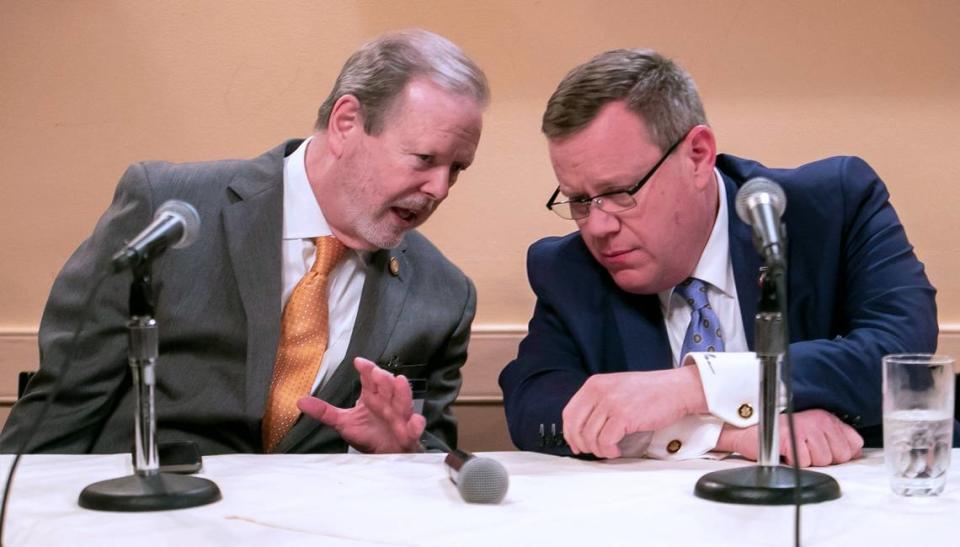How much public money should NCInnovation get — if any at all? A debate.
As House and Senate Republicans hash out a state budget, with passage destined for sometime after Sept. 1, the faith of an ambitious new nonprofit is at stake.
Formed in 2020, NCInnovation aspires to help UNC System researchers turn their academic work into revenue-generating businesses. The group is backed by several North Carolina university chancellors and some of the state’s most prominent companies — including Truist Bank, Duke Energy and Bank of America.
Proponents point to studies that show North Carolina’s innovation output lags behind its robust research and development.
But the idea — particularly its scale — has been controversial.
In May, the GOP-led Senate proposed giving NCInnovation $1.425 billion to establish a self-sustaining endowment from which it would award grants to academic entrepreneurs. The figure marked much of the state’s current revenue surplus. According to the state office of budget and management, it was the largest single spending item ever designated for a nonstate entity in North Carolina.
In contrast, the budgets proposed by Democrat Gov. Roy Cooper and the Republican-controlled House each offered the nonprofit $50 million. With a veto-proof supermajority in both chambers, Republicans hold the cards on NCInnovation.
How much taxpayer money should the organization receive — if it should receive any at all?
The News & Observer spoke to two stakeholders who hold firm but opposing answers.
Thom Ruhe is president and CEO of NC IDEA, a private foundation that awards grants to early-stage startups across the state.
Donald Bryson is the CEO of the John Locke Foundation, a conservative think tank based in Raleigh.
The below conversations, conducted separately, have been edited for clarity.
Thom Ruhe, NC IDEA
What’s your overall stance on the NC Innovation proposal?
I’m well versed on what NC innovation is attempting to do. I met with the team multiple times. I’m a fan. I think it’s a big, bold move to advance technology-based economic development, and it’s on par with what other states are doing.
Some have criticized the price tag of the Senate’s funding proposal, especially for a new nonprofit. What would you say to them?
This is not some big, largesse scheme that some of the detractors might try to characterize it.
I think a part of the story on this NC Innovation controversy, if you want to call it that, is that there are other states in the country that are making as big, if not bigger moves, and North Carolina doing this is a way to stay competitive. This is so we don’t backslide and lose ground.
What’s going to happen over the coming years, you’re going to just see a bigger and bigger gap between the states that are investing in their entrepreneurial innovation.
What do you think would be the right amount for an endowment?
Is $1.4 (billion) the right number? I’m not smart enough to know the answer to that question. But I know if you really want to do it right, you need a really big number which lets you take a long view. If you have confidence that you’re going to have funding five years out, then you can make a five-year plan. That’s the benefit of funding it that way.

Your organization gives grants to North Carolina startups. Do you see a need for a similar, and much larger, organization like NCInnovation?
There’s so much untapped potential. Every fall and every spring, we do a grant cycle. We get hundreds of applications. And we’ll make six-ish $50,000 grants and 15 micro grants of $10,000 each.
(NC IDEA ranks applicants using qualitative metrics.) After the six companies that get funded — the difference for the ones that are number seven or eight on our list is negligible. If we had more money, we could deploy two to three times what we deploy every cycle. We just don’t have the money (Ruhe said NC IDEA’s endowment is currently around $50 million.)
So, I see NC innovation filling one glaring gap.
What do you say to the argument that the state government should stay out of the venture capital field?
When we’re recruiting like a big company, a big name like VinFast or Apple, we don’t bat an eye at state largess. We just need to pivot our thinking to feel the same when it comes to supporting nascent things which are organically homegrown (North Carolina has 16 public universities and 58 community colleges).
We throw this money at a company that’s not even here, but we ignore men and women who have spent 10 years toiling away in obscurity, quietly building out a great company that creates very important jobs in smaller communities, and they get nothing.
Some argue any public money promoting private entrepreneurship is wrong.
That’s the John Locke argument: The government shouldn’t be betting on winners and losers. Let me answer with what I can directly speak to and that’s our own data. And that’s the beauty about an organization that’s been around since ‘05.
“We put $10 million into (startups) directly. We put another $10 million in the ecosystem. $20 million that’s created over 4,400 jobs. Our cost per job rate is a fraction of what we throw at companies trying to entice them to move here.”

But a non-insignificant amount of the funding will go to companies that fail.
We look at it as portfolio theory. Yes, some are going to go out of business. Some will kind of march along, not going out of business but not blowing up. And then some are going to go big. And in the aggregate, the advantage will outweigh the costs.
But this notion that we shouldn’t be making bets, I totally disagree. If you don’t think investing in yourself is a good idea, then you should probably ask why you’re doing what you’re doing.
That is really what the NC Innovation effort is. It’s an investment in ourselves and if we really believe that we have a world class innovation system, and world class entrepreneurship ecosystem, then I think it’s one of the best investments we can make.
Donald Bryson, John Locke Foundation
What do you think of the NC Innovation proposal?
I think the idea of NCInnovation is a good idea. I don’t think it being taxpayer-funded is a good idea. But I think if somebody wants to set up a private nonprofit to do what they’re wanting to do, that goal is absolutely laudable. I just don’t think taxpayers should have to be part of it.
And the $1.4 billion price tag?
I think the $1.4 billion price tag is probably the elephant in the room. And that’s just a lot of money. It wasn’t vetted through any particular committee. It was just sort of dropped in the budget. And being a public policy organization that focuses on all the state budgets, we obviously have a lot of questions and we went digging and didn’t find very many answers.
The State of North Carolina is very cash heavy right now, and we’ve been very fortunate for a lot of reasons to be that way, and somebody is trying to take advantage of that fiscal situation. And I think that’s unfortunate.

Do you think NCInnovation should get any public money?
In terms of taxpayer dollars, when it comes to NCInnovation, I would argue and have argued that taxpayers have already invested.
Taxpayers are already involved in that process. They pay for the universities; they pay for the laboratories; they probably pay for the scholarships for people who invented the stuff. Taxpayers are already on the hook and involved in this process. Why do we also have to fund as taxpayers the venture capitalist side of the business as well and then see no return?
But wouldn’t there be a return when the companies NCInnovation funds create jobs?
I mean, it would be (a return) very indirectly.
It’s just not the place for state government to pick the winners and losers in the economy.
There’s just no way they can have enough knowledge or anybody can have enough knowledge to know what’s coming next in the economy. And it’s just inappropriate if we’re supposed to treat all taxpayers equally for the government to say, ‘We’re going to take money from these taxpayers and transfer it to the taxpayers over here.’
(While Ruhe and other NCInnovation supporters tout the promise of similar entrepreneurial programs in states like Ohio, Massachusetts and Texas, the John Locke Foundation contends these initiatives have fallen short of their goals. Bryson pointed to a June op-ed by the conservative think tank The Buckeye Institute that warned North Carolina about following a model like Ohio Third Frontier.)
NCInnovation supporters cited studies that show North Carolina ranks near the middle of pack nationally in terms of innovation. Doesn’t this show a need to develop more of the R&D we create on campuses?
Well, about a month ago, North Carolina repeated as the best state in business for the CNBC rankings. Well, in those rankings, North Carolina is number six in innovation and technology and also number six in access to capital. Also, number one overall best state for business. So, who are we chasing exactly?
Yes, we have a surplus. We also have a shortfall in the state health plan. So instead of making up things to fund, why don’t we fund the liabilities we currently have? Or if we don’t actually need the money, instead of making things up to fund, why don’t we send some of it back to taxpayers who actually earned the money?
Open Source
Do you enjoy Triangle tech news? Subscribe to Open Source, The News & Observer's weekly technology newsletter and look for it in your inbox every Friday morning. Sign up here.

